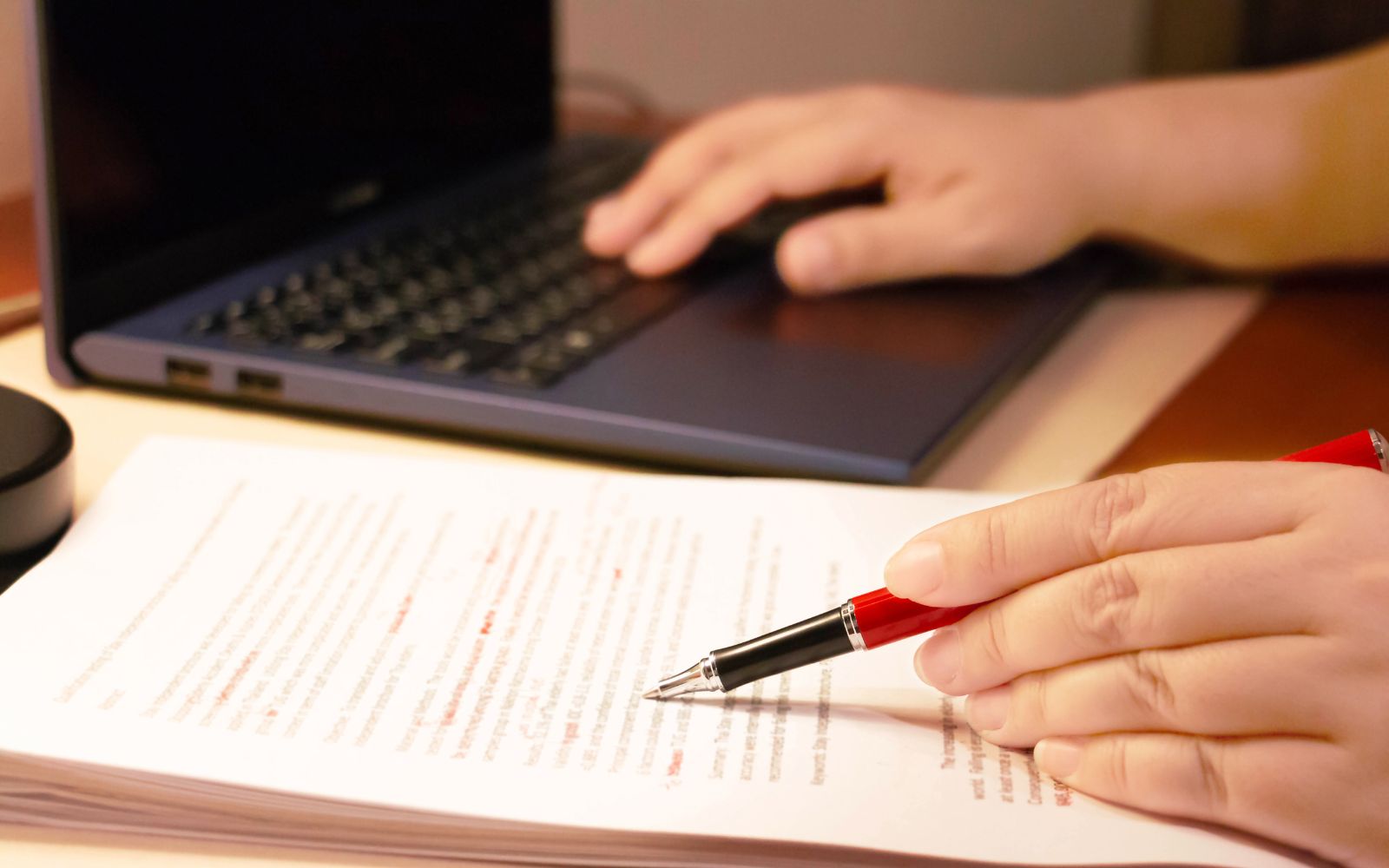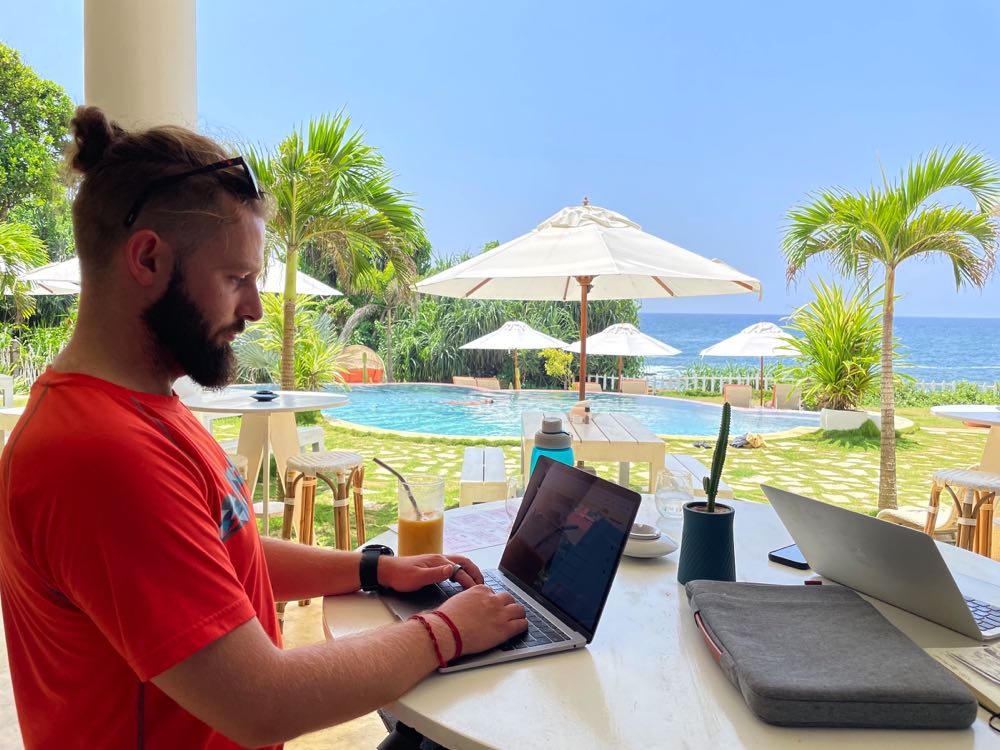
[ad_1]
Want to make good money online? Whether you’re an aspiring digital nomad or you just want some extra spending cash, proofreading could be the perfect answer for you.
I started out as a professional proofreader while living abroad in Japan, and the extra cash provided me with the means to visit a ton of amazing destinations, from Okinawa to Tokyo!
Not only is there a low barrier to entering the freelance proofreading market, but there’s also an abundance of flexible proofreading jobs online. But how do you become a freelance proofreader? What are the requirements? Where do you find work? And how much can you realistically earn as a beginner?
To find out, continue reading: this is my ultimate guide on how to become a proofreader.
What Does a Proofreader Do?
Before I get into how to become a proofreader online, you may be wondering, what does a proofreader do exactly? And what’s the difference between a proofreader and a copy editor?
Proofreaders thoroughly check written content for errors. This can include mistakes in grammar, spelling, punctuation, style, syntax, and formatting. They’re essentially there to make sure your writing is free from any silly and avoidable mistakes.
In contrast, copy editors look at the big picture. Does this argument make sense? Is this paragraph redundant? Are there issues with readability? Does the tone fit? See also: Complete Guide and Review of the Knowadays Editor Course
While both proofreaders and copy editors are essential for perfecting a piece of writing, proofreaders are there to fix the more simple and straightforward writing mistakes, while editors point out the greater flaws overall.
Requirements to Become a Proofreader Online
So, how do you become a proofreader? Many people think that an English degree, or any undergraduate degree, is required to become a professional proofreader. Luckily, this isn’t true!
Furthermore, there isn’t any official proofreading certification, which means you can become a proofreader at home without the hassle of an expensive education.
Despite this, there are definitely some specific qualities that will help you excel as a proofreader, including:
Excellent English Skills: A bit of a no-brainer, but necessary nonetheless. If you’re wondering how to become a proofreader without any prior experience, the number one requirement is that your English skills are exceptional. And luckily, your English can always be improved with courses and practice.
Meticulous and Detail-Oriented: In order to perfect a piece of writing, you first have to notice all the mistakes. That’s why being meticulous and detail-oriented are absolutely necessary attributes for proofreading.
Patience: Trust me, patience is a must when you’re dealing with difficult pieces of text (or clients!).
Time Management Skills: Since you’ll be working independently, it’s up to you to manage your schedule and meet your deadlines. Organization and time management are musts!
Familiarity with Style Guides: A great source of freelance proofreading jobs comes from students, so being familiar with one or many style guides is essential. Some of the most common style guides include APA, MLA, and Chicago. If you’re completely unfamiliar with any of these style guides (or you need a refresher), check out this great resource.
Post-Secondary Education: Yes, I know I just told you that an undergraduate degree isn’t necessary… While an undergraduate degree isn’t required to become a professional proofreader, a post-secondary qualification definitely helps, (especially if you’re wondering how to become a medical proofreader).
I majored in behavioral neuroscience, which positively helped me get clients with neuroscience, biology, and psychology students. And it makes sense; clients trust proofreaders with experience in their niche.
So, while it isn’t entirely necessary, if you do have a college degree, I would recommend emphasizing it with the right potential clients.
How to Become a Proofreader (5 Steps)
Now that we’ve gone over what proofreading is and the requirements for becoming one, you may be asking me, “but how do I become a proofreader?”
Here are my five steps on how to become a proofreader. While you don’t have to follow these steps and tips exactly, doing so will definitely provide you with the right tools and mindset to get started.

1. Take a Proofreading Course
As I said before, you don’t need an English degree to become a proofreader. But, you may still be wondering how to become a proofreader without a degree. The best way to learn to be a proofreader is by taking a course, and thankfully there are many online options to choose from.
Even if you’re comfortable with your English skills, taking a proofreading course can be incredibly beneficial when it comes to kick-starting your proofreading career.
When I first started out as a professional proofreader, I took a crash course on grammar, syntax, and punctuation, and it was instrumental in boosting my confidence. It was also useful in reminding me of the countless rules of grammar.
A great class to check out is the Knowadays proofreading course. With comprehensive modules on grammar, punctuation, spelling, academic proofreading, business proofreading, and finding work, it’s the best way to get started.
Knowadays is currently offering 15% off its proofreading and editing course, you can learn more about that here. For more information on courses to support your proofreading journey, take a look at my article on the 10 best online proofreading courses.
Overall, taking a course will definitely help to build your confidence, improve your grammar, and increase your efficiency (and consequently, your income). It’s especially useful for those wanting to learn how to become a freelance proofreader without any previous experience.
2. Have the Proper Software and Tools
Next, a key step in becoming a proofreader is investing in the right software and tools.
This can include some of the obvious but necessary tools, such as a laptop or desktop and a mouse. This can also include some software essential for proofreading documents, such as Microsoft Office, Google Docs, and Adobe Acrobat.
But, you can also invest in proofreading software. Although no proofreading software catches every grammatical or spelling mistake, most of them are helpful when it comes to saving time and fixing some common writing errors. Some of the best proofreading software include Grammarly, ProWritingAid, and LanguageTool.
Investing in proofreading software was the biggest step in my proofreading career, as it bumped up my efficiency and profits. If you want to learn more, check out my article on the best proofreading software.
3. Figure Out What Proofreading Services You Want to Offer
Now it’s time to decide what services you want to provide. Whether you want to know how to become a book proofreader or a business proofreader, there are many different options you can choose from, including:
- Academic Proofreading: You can proofread a wide range of possible documents in this area, including journal articles, research papers, theses, dissertations, admission essays, or even student essays. But note that this type of proofreading absolutely requires you to know your style and citation guides (MLA, APA, Chicago, etc.) inside and out!
- Business Proofreading: As a business proofreader, you can expect to work on a lot of resumes, press releases, business reports, business proposals, user manuals, and more.
- Print Media Proofreading: If you’re wondering how to become a proofreader for novels, you should focus on print media proofreading. As a print media proofreader, you can expect to proofread books, magazines, newspapers, and textbooks.
- Translation Proofreading: If you’re fluent in more than one language, translation proofreading may be the perfect fit. These documents are written by those whose first language isn’t English, so it’s usually associated with some awkward wording and contextual spelling mistakes. You’ll also frequently be asked to go over the original document to make sure everything was translated properly.
So, how do you choose which services you’ll offer? At the end of the day, it’s up to you to decide! I would focus on where your interests lie and where you have the most expertise.
Personally, I focus on academic proofreading as that’s where my interest and expertise lie. This allows me to both stand out amongst the competition and enjoy the work I accept – it’s a win-win.
4. Create a Resume
Next, it’s time to create a proofreading resume. This is a vital step in becoming a proofreader, as it emphasizes your professionalism, credibility, and expertise. But you may be wondering, “what should I add if I don’t have any previous proofreading experience?”
I recommend including any related or relevant skills and experiences you can think of. Have you proofread any of your classmates’ work during school? Do you proofread your co-workers’ business proposals? Can you gain some experience by offering to proofread for your friends?
When I first started out as a professional proofreader, I emphasized my previous experience proofreading for my mom. She translates documents from Japanese to English, and I frequently proofread the final versions to get rid of any punctuation errors or awkward wording. Highlighting this previous experience was invaluable and helped me secure my first clients.
What else can you add to your resume? Unfortunately for those wondering how to become a certified proofreader, there are no official proofreading certifications. However, adding the proofreading courses you’ve taken can certainly boost your credibility.
5. Search for Proofreading Jobs
Now that you’ve polished up your resume, it’s time to find your first proofreading job.
This can be done in many different ways, but one of the best ways for beginners to find work is online. Freelance job platforms like Upwork, FlexJobs, and Fiverr are filled with proofreading jobs. You can also apply for a job at a proofreading company like Scribendi or Proofreading Pal, or you can try networking if you’re familiar with any professional proofreaders.
If you’re wondering how to become a proofreader on Fiverr, Upwork, or FlexJobs, you can check out this article on getting started at Upwork.
Note that your earnings may not be the best at first, but as you gain more experience as a professional proofreader, you’ll be able to leverage that experience to make more money.
How To Find Work as a Proofreader
A key step in learning how to become a proofreader is finding work. So, let’s go into more detail on how to find work as a proofreader.
Here are the top 5 proofreading jobs online for beginner proofreaders:

1. Through a Proofreading Course
As I mentioned before, one of the best ways to learn how to become a freelance proofreader is by taking a course. But, what I didn’t mention is that it can also be one of the best places to find proofreading jobs!
After taking the proofreading course at Knowadays and passing their proofreading test, they offer guaranteed work with their partner company, Proofed. To learn more, check out their website.
2. FlexJobs
Another great way to find proofreading jobs online is on Flexjobs. A huge freelance job platform filled with opportunities for both entry-level and experienced proofreaders, FlexJobs is one of the best places out there to find freelance work.
With a user-friendly interface and less competition than similar sites like Upwork, FlexJobs is one of the best websites to get started as a professional proofreader. However, it does cost $24.95 per month to access. Click here and use promo code NOMAD to receive 30% off the membership fee.
3. Upwork
A website similar to FlexJobs, Upwork is one of the largest freelance job platforms on the internet. Perfect for beginner proofreaders, Upwork is filled with a plethora of proofreading opportunities. And unlike FlexJobs, it’s free to access!
However, this also comes with its disadvantages, the most inconvenient being that it can be quite competitive and difficult to find work. In order to stand out amongst the competition, you may find you have to undersell yourself at first. But, it’s still a great way to gain some experience that you can use as leverage later on for higher rates.
Overall, if you’re wondering how to get into proofreading, Upwork is the best website to get you your first job.
4. Scribendi
A company that specifically provides proofreading and editing services, Scribendi is one of the best choices if you want to learn how to become a proofreader from home. Hiring remote proofreaders around the world, Scribendi offers consistent proofreading work and tons of flexibility.
Scribendi also offers free courses on how to tune up your proofreading, and a forum to connect with fellow freelance proofreaders. The application process can be a bit difficult so a little patience is required when signing up.
I joined Scribendi when I first started out as a professional proofreader, and having access to consistent proofreading jobs provided me with a great safety net while I was securing other clients.
5. Scribbr
Last but not least, Scribbr is an academic proofreading and editing company that focuses on graduate student theses and dissertations. Offering lots of flexibility, proofreaders at Scribbr earn an average of $20 to $30 per hour.
However, the application process can be quite rigorous; it includes completing and passing a language quiz, a test assignment, and their academy training program. Nevertheless, if you make it out on the other side, you’ll get consistent, high-paying work!
How Much Do Proofreaders Make?
So far, we’ve covered how to become an online proofreader. But, you may still be wondering how much you can expect to make as a beginner proofreader, and how much you can make as you gain more experience.
Proofed, the partner company of Knowadays, claims that beginner proofreaders can expect to make $15 to $20 per hour. However, as proofreaders gain more experience, this can rise to $25 to $50 per hour.

The difference in rates is completely based on your speed and the jobs that you’re picking up. And this comes from practice and experience. As you get faster at proofreading, you’re able to complete jobs more efficiently, which increases your hourly rate. You’re also able to pick up more jobs once you’re working at a quicker pace.
This also depends on the type of proofreading you’re doing, and the company you work for. Overall, proofreaders can expect to make $25 to $45 per hour, with the average being around $30 per hour.
Pros and Cons of Being an Online Proofreader
So far, we’ve talked a lot about how to become a professional proofreader. But, you may still be wondering if this is the right job for you. So, here are some advantages and disadvantages of becoming a freelance proofreader:
Pros of Becoming a Proofreader Online
- You get to be your own boss!
- With no manager or supervisor, you can enjoy a lot of flexibility in your schedule. That means you can work as much (or as little) as you want, and you can schedule your work around your other daily responsibilities.
- There’s a high demand for proofreaders, and there’s a wide variety of documents you can proofread. From blogs, admission essays, emails, research papers, and books, there’s a plethora of options to choose from.
- It can be really fun, interesting, and educational to read the documents! I always loved proofreading student research papers on sociology, anthropology, and linguistics.
- You get to work from home, or from anywhere in the world. This was the biggest allure for me; when I first started out as a freelance proofreader, I was living a nomadic lifestyle in Japan – it was great.
- There’s a low barrier to entry. So, for those wondering how to become a proofreader, you don’t need much to start! Just a computer and WiFi will suffice.
Cons of Becoming a Proofreader
- You occasionally get bombarded by an influx of new projects and tight deadlines. Trust me, this can get quite stressful!
- The work can get a bit repetitive and tedious at times, especially if you’re proofreading a complex or dull document.
- While an advantage of proofreading is the flexibility, this is a double-edged sword; if you’re not good at working independently (or you procrastinate a lot), proofreading might not be right for you. A certain amount of discipline is required.
- You occasionally have to deal with tricky and picky clients.
- It can take a bit of time to build up a steady client base.
How to Become a Proofreader: FAQs
Here are answers to some commonly asked questions on how to get started proofreading:
You don’t need any official qualifications or certifications to become a proofreader, but some key skills include being detail-oriented and flexible, and having excellent English abilities and time management skills.
The best way to learn how to get started as a proofreader is by taking a course, such as the proofreading course at Knowadays. Not only will it look good on your resume, but it will also fine-tune your English and proofreading skills and provide you with the top tips on how to find work.
Proofreaders are required in a variety of different sectors, so they’re absolutely in demand! From proofreading blogs to books, magazines, student essays, business proposals, emails, dissertations, translations, and more, there’s an abundance of job opportunities available.
While there can be a bit of a learning curve when first starting out as a proofreader, proofreading isn’t a difficult skill to learn! With plenty of practice and repetition, it’ll become easier to spot common writing mistakes, and you’ll get faster and more efficient at proofreading documents.
Beginner proofreaders can expect to make around $15 to $20 per hour, but as most documents are paid per word count, this depends on you! As you gain more experience, you’ll inevitably get faster at proofreading, which will increase your hourly rate.
Yes, there will always be a strong demand for proofreading. Even with the rise of proofreading software like Grammarly, A.I.-powered proofreaders aren’t able to perfect a piece of writing like a human can; they’ll always miss some mistakes, awkward wording, or contextual errors.
Proofreading jobs absolutely pay well! You can expect to earn a starting rate of $15 to $20 per hour, which can quickly increase to $25 to $50 per hour with practice, experience, and time.
In Conclusion
I hope this article helped you learn how to become a proofreader! As you can see, there are many different steps involved in getting started, from taking a course, investing in software, choosing your field, writing a resume, and applying for jobs.
You might feel slightly overwhelmed at first; I was definitely stressed when I first started out! But just reading this article has taken you one step closer to becoming a proofreader online. Soon enough, you’ll be making good money working from home (or from a beach in Mexico!). So, buckle up, get your laptops ready, and get to work!
Like This Article? Pin it!
[ad_2]






